A collection of French postcards 19th century. Amazing things.
Hello all! If you've ever struggled to imagine how life will change over the next century thanks to technology, take comfort — you're not alone. Over 100 year ago, some French artists tried to do the same thing. In 1899,a commercial artist named Jean-Marc Côté and other artists were hired by a toy or cigarette manufacturer to create a series of picture cards as inserts, according to Matt Noval who writes for the Smithsonian magazine. The images were to depict how life in France would look in a century's time, no doubt heavily influenced by Verne's writings. Sadly, they were never actually distributed. However, the only set of cards known to exist was discovered by Isaac Asimov, who wrote a book in 1986 called "Futuredays" in which he presented the illustrations with commentary.
To begin, technological strides were made in electromagnetism and wireless communication that led to the invention of the telephone and radio during the latter decades of the 19th century. To the artists, these technologies must play an important part in the future, so a machine was imagined that would transcribe spoken language into print, something that automated audio transcription services like Dragon Dictate or voice recognition with Google Search now make possible:

Another card shows video calls imagined from the technology of the day (a projector) but functionally the same as Apple's FaceTime or Google Hangouts:

Other types of advances in projection were expected as well, allowing microscope or telescope images to be much more visible. While projection technologies like these were developed, today digital instruments and monitors are the workhorses for microscopy:
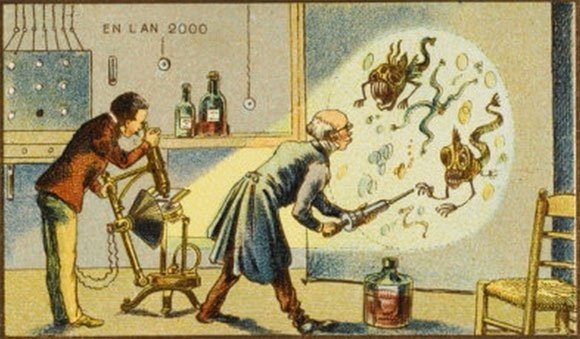
Among the collection, personal automatons — or robots as we call them — showed up prominently. Clearly, the artists felt they would be a big part of the future, taking care of many of the mechanical tasks used in daily life, such as robot barbers:
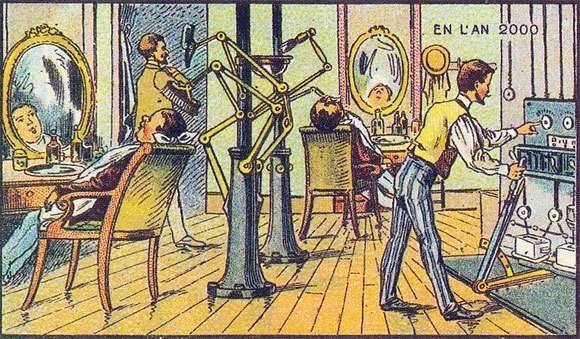
For women, the vision was more extensive:

One card shows all the instruments of an orchestra being controlled by the conductor, which isn't too far off from the robotic instruments designed by Festo:

Recent advances in 3D printing almost beg for houses and other buildings to be printed out, if the technology could be worked out:
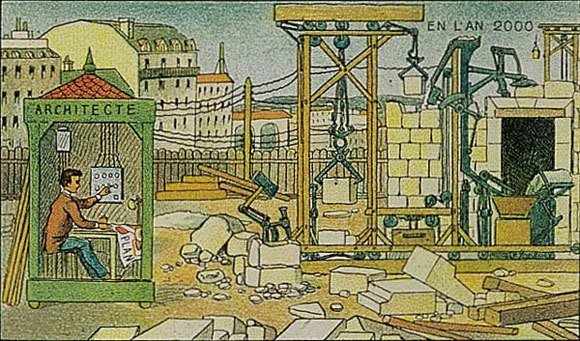
The artists also imagined how robots would have an even bigger impact on society, as in helping farmers plow fields. Robots on farms:
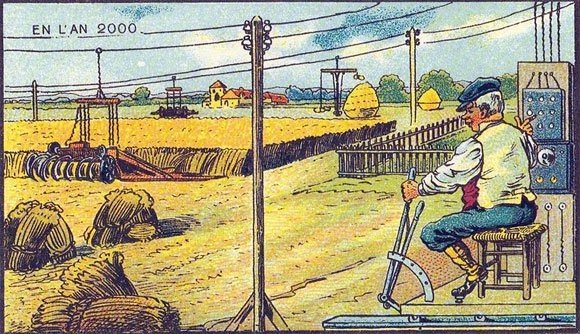
One illustration that shows books being ground up and fed directly into the ears of schoolchildren. While it may
seem a bit to Matrix-like to become a reality, one could argue that this is fundamentally what an audiobook is or
what the Internet does with information:
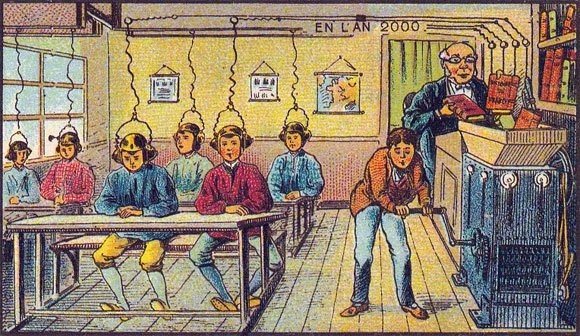
On one illustration depicted the modern kitchen as a place of food science. molecular gastronomy in fine dining has made food chemistry a modern reality:

The artists were fascinated by the possibilities of flight. This makes sense, considering that powered gliders were
in development during the 1890s, the first Zeppelin was being constructed in 1900, and the Wright brothers made
their historic flight in 1903. But personal flight was envisioned to be much more integrated into daily life, envisioning that wings would help people do all sorts of things like delivering mail:

Air transport was also imagined, and though they didn't quite capture modern air travel, they weren't too far off:

The artists also seemed to believe that people would be interacting with ocean life as a part of their daily lives.
Sad that the ocean is still such a mystery, but perhaps Google's efforts to allow underwater exploration in Google
Maps will begin to help:

These illustrations are a testament to a handful of very creative artists who tried to bring a vision of the future to the masses.
Thanks.
Hi! I am a content-detection robot. This post is to help manual curators; I have NOT flagged you.
Here is similar content:
http://telecomworld.itu.int/predictions/life-in-france/
Oh @belkin - this really should have more attention than it does at the moment. The cards and your interpretations are great! I had no idea they existed. I wonder if our renderings of the future are already on the movie screens (Star Trek)? What a wonder it would be...
Upvoted
Hi! This post has a Flesch-Kincaid grade level of 10.5 and reading ease of 58%. This puts the writing level on par with Michael Crichton and Mitt Romney.